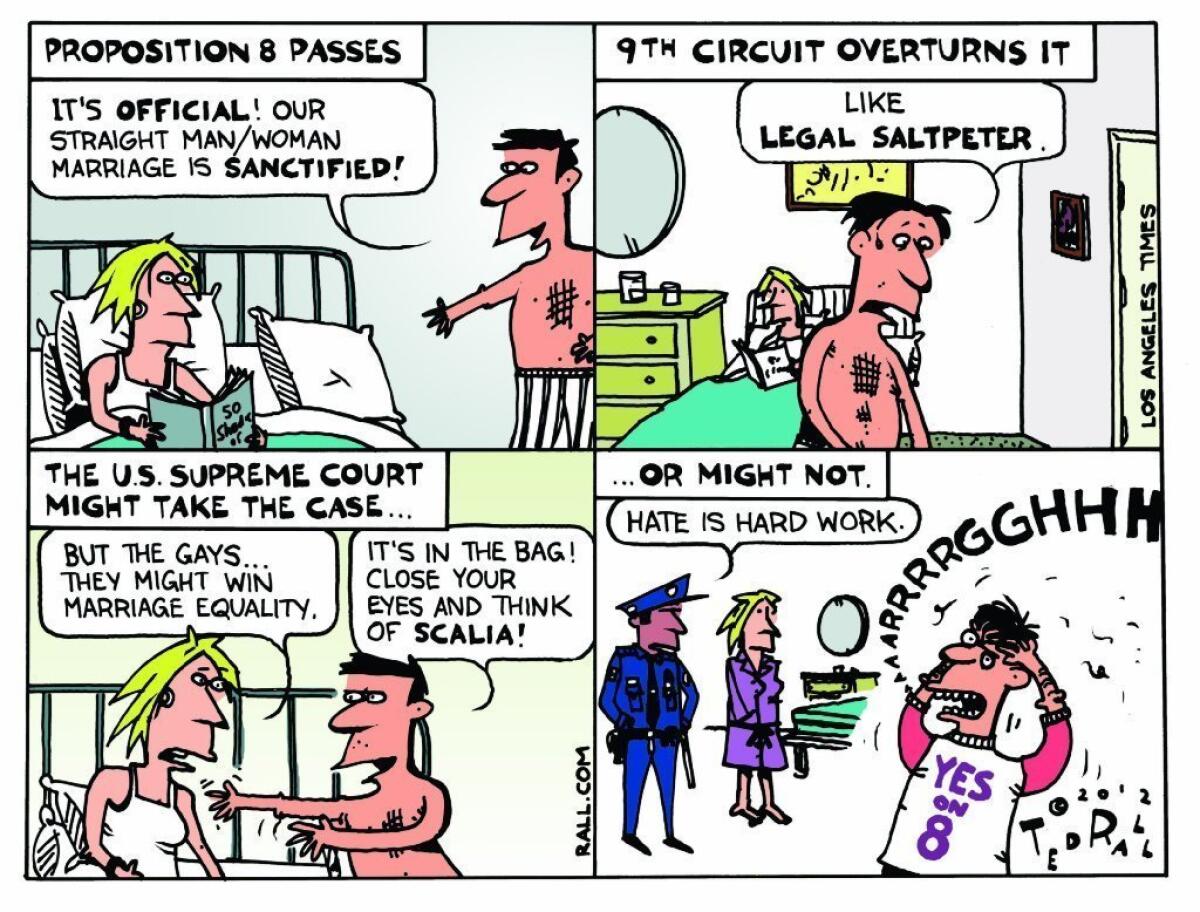Obama’s low-key brief on Proposition 8

Supporters of same-sex marriage are both pleased and perplexed by the friend-of-the-court brief the Obama administration has filed with the Supreme Court in the Proposition 8 case.
They’re pleased because Solicitor General Donald Verrilli argues that Proposition 8 is unconstitutional and that the court should examine it with “heightened scrutiny” because (among other reasons) gays and lesbians have suffered discrimination.
They’re perplexed because, having massed this heavy constitutional artillery, the brief doesn’t insist that same-sex couples everywhere in the country have a constitutional right to marry.
TIMELINE: Gay marriage chronology
Instead, the brief advises the court that it “can resolve this case by focusing on the particular circumstances presented by California law” -- namely, the fact that California provides for same-sex domestic partnerships. The brief recycles an argument that figured in the California Supreme Court’s 2008 decision allowing same-sex marriage (the decision that was overturned by Proposition 8). The argument goes this way: If a state approves of marriage in everything but name for same-sex couples, then the withholding of the name is proof of what the Obama brief calls “impermissible prejudice.”
The brief makes this point in connection with what is likely to strike the justices as the most sensitive issue in the case: the relationship of marriage to the nurture of children. “Notwithstanding Proposition 8,” the brief says, “California law continues to grant same-sex domestic partners the full extent of parental rights accorded to married couples. In that context, the exclusion of same-sex couples from marriage bears no subnstantial relation to any interest in promoting responsible procreation and child-rearing.”
This is an ingenious legal argument, but it obviously applies only to states that have enacted domestic partnerships or civil unions. And if it were to be endorsed by the Supreme Court, it could have the perverse effect of discouraging legislators in conservative states from supporting civil unions, leaving gay couples in those states with no protection.
Perhaps the administration thought that full-throated assertion that all laws against same-sex marriage violate the equal protection clause of the 14th Amendment would seem more like a political statement than the sort of considered reflection for which the court relies on the solicitor general’s office.
But the justices aren’t fools. They know that this document, unlike a brief in, say, a convoluted intellectual property case, speaks not for career lawyers in the Justice Department but for the president. If the point of this exercise was to remind the court that the executive branch has embraced marriage equality, why not paint with bright colors?
Obama was essentially asked that question at his news conference Friday.
First he said: “The solicitor general in his institutional role going before the Supreme Court is obliged to answer the specific question before them. And the specific question presented before the court right now is whether Prop. 8 and the California law is unconstitutional.” Yes, but the solicitor general was free to argue that Proposition 8 was unconstitutional because any ban on gay marriage would be unconstitutional.
Then he seemed to have second thoughts about the narrow approach. If the court decided that there was no good reason to forbid gay marriage in California, he said, maybe it would decide that “it can’t apply in any case; there’s no good reason for it. If I were on the court, that would probably be the view that I’d put forward.”
So why didn’t he?
ALSO:
Why liberals should love Justice Scalia
The 10 trigger-happiest states in America
This won’t last: Beverly Hills house for lease, $600,000 a month
More to Read
A cure for the common opinion
Get thought-provoking perspectives with our weekly newsletter.
You may occasionally receive promotional content from the Los Angeles Times.







